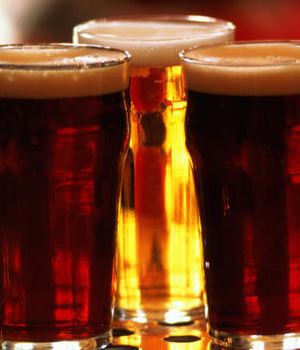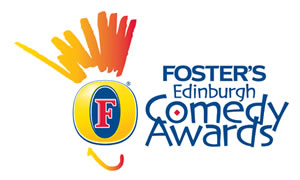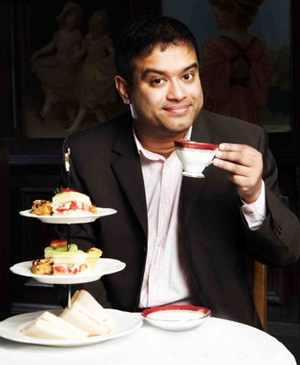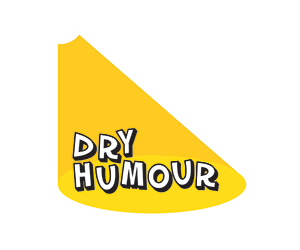Dry Humour - Comedy Versus Alcohol

The autumn season of comedy is approaching, which means comedians and comedy fans will be indulging in a drink or two. Or three. But, as the relationship between comedy and alcohol gets more intertwined, it's worth looking at whether this is good for us, as comedy fans. After all, Paul Merton recently announced he was quitting stand-up because he was tired of dealing with drunk people.
Many great comedy characters are known for overindulgence. Father Jack, Rab C. Nesbitt and Patsy Stone all share drunkenness as a character flaw. This is not a modern age phenomenon; in fact traditional clown costumes were designed to be caricatures of drunks, stumbling around with big red noses, bloated midsection and torn, mismatched clothing. But what about the audience?
Comedy and drinking have a long history here in Britain. Live comedy started life in the old music halls, and pubs and bars started putting on comedy to entice punters in to buy drink. However, the necessity for alcohol when watching comedy seems almost uniquely British. In fact, in many American comedy clubs there's a tradition of the two-drink minimum, otherwise people don't bother with the bar.
The Comedy Store in Hollywood note on their website: "2 drink minimums have been a feature at comedy clubs about as long as 'Take my wife... please' and 'So where are you guys from?' It's how we pay the bills and keep the laughter going for you every night."
British audiences need no such strong-arming and will happily go to the bar without much prompting. In some clubs the bar even comes to them, with waitresses offering tequila at the table. All of this adds up to a uniquely boozy experience, which might be starting to affect the comedy itself.
Comedy has been labelled 'the new rock and roll', and there's a common belief that stand-ups are up all night necking whiskey and living a life we never could, just like the rock gods of old. But a report by TV channel Dave found 70% of comedians don't touch a drop of alcohol before going on stage. Even Bill Hicks, one of the most rock and roll comedians, gave up drinking in 1988 (6 years before his death).

With alcohol sponsorship on the rise as comedy becomes more mainstream, it will be interesting to see how relationships change. The most prestigious live comedy award in the country is now named after a beer brand - The Foster's Edinburgh Comedy Awards. In fact, 70% of those asked in a 2013 survey by the Comedy Research Group associated Foster's with comedy.
If anything, this level of sponsorship and brand recognition could be considered in bad taste considering how many comedians have experienced problems with alcohol. Many big names have battled drinking problems; some publically, others privately. Most come through the other side, and have a healthier relationship with alcohol - still drinking, but no longer using it to help cope. Others realise a deeper problem and become teetotal, taking to comedy again with a newfound sense of passion in their sobriety. And, of course, some don't make it through at all.
One of the most worrying aspects of the link between alcohol and comedy is the affect this could have on young people. Studies have shown that normalising drinking at a young age (such as via marketing) reduces the age at which people start drinking, increases the likelihood of them drinking and increases the amount they consume when they've started. And, as the link between comedy and drinking becomes tighter, the distinctions begin to blur. Even Friends, a show notable for drinking coffee over alcohol, got Comedy Central into hot water by airing adverts for alcohol when the show itself was deemed to appeal to children.

While I do drink, I'm not exactly a big drinker, especially at live comedy (more through bladder-control than moral reasons). I was recently offered the opportunity to work for Alcohol Concern to organise a comedy night without alcohol, named Dry Humour. Needless to say I leapt at the chance.
Performing to a sober audience seems to be a bit of a novelty for the acts. Paul Sinha (pictured), who is one of the comedians on the bill, says: "As a comic, I have become a veteran of binge drinking Britain. In comedy clubs up and down the country, stand-up and alcohol have become remarkably intertwined.
"So many times I have seen people's inability to pace themselves responsibly ruin a comedian's set, ruin a gig or ruin an entire evening. Evenings that started with high hopes and expectations left in tatters by a simple fact. If you are going to poison yourself, you need to show some nous and restraint.
"I love alcohol. As a social lubricant it has few peers. But I hate the slightly bullying assumption that it is an essential part of a night out, and that if you are not partaking at a frightening pace, then you are an outsider."
The compère for the night, Rob Thomas, explains: "Some of the comedians performing have a connection with the issues that Alcohol Concern are campaigning for, and were falling over themselves (soberly) to volunteer their time and talents to help debunk the myth that to laugh you need a drink."
Comedian Jim Smallman comments: "Whilst I'm obviously fine performing for an audience that is drinking (I'd be out of a job if I wasn't!), it's a fun challenge to perform to a sober audience. I've not had a drink for 16 years, so I'll probably bring sweets to thank them for being dry for the night."

As much as a novelty this will be for the acts, we're hoping the audience will find it uniquely refreshing too. Comedy has incredible power to unite groups of complete strangers in a shared experience of enjoyment. It brings us together in a far more lasting way than alcohol ever could.
Dry Humour will be taking place on behalf of Alcohol Concern on Wednesday 17th September. The line-up so far includes Stewart Lee, Joe Wilkinson, Paul Tonkinson and many more. It's being held at the Leicester Square Theatre with tickets priced at £14.50. Details and tickets
Help us publish more great content by becoming a BCG Supporter. You'll be backing our mission to champion, celebrate and promote British comedy in all its forms: past, present and future.
We understand times are tough, but if you believe in the power of laughter we'd be honoured to have you join us. Advertising doesn't cover our costs, so every single donation matters and is put to good use. Thank you.
Love comedy? Find out more
